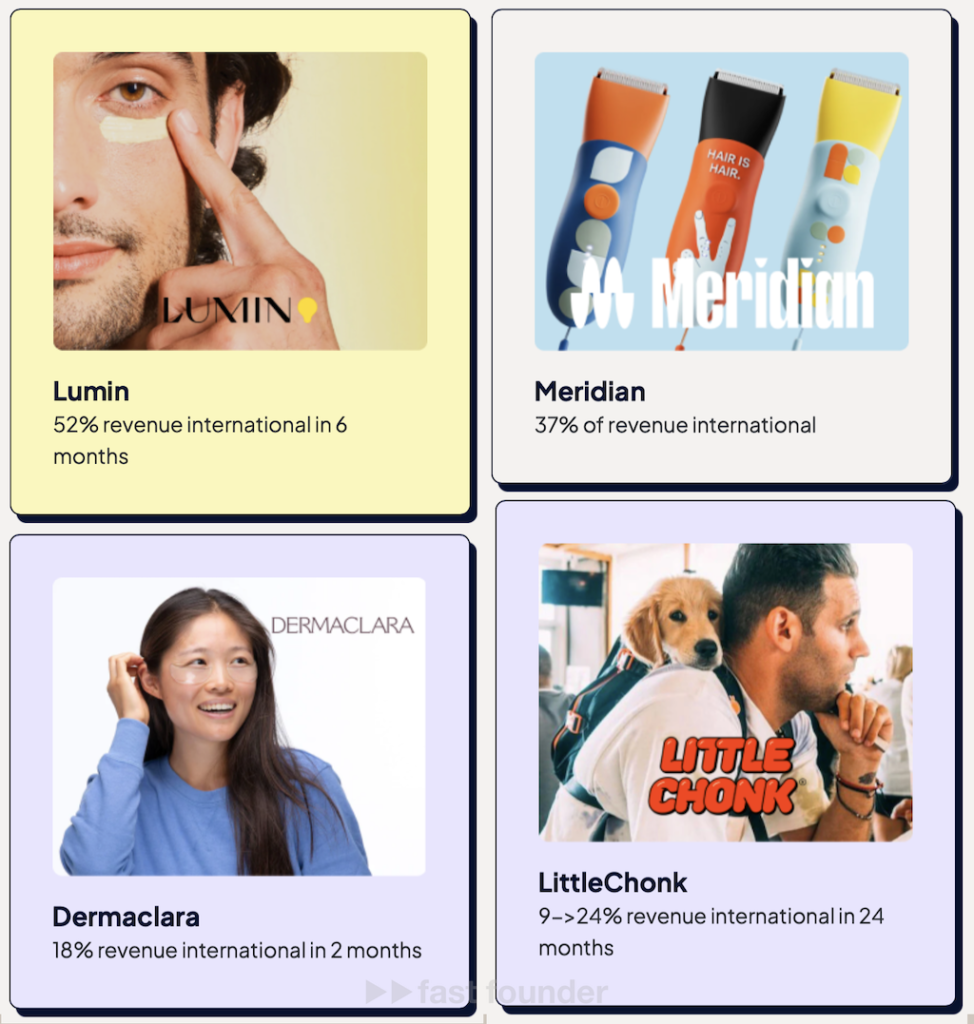- In fact, it’s much easier to help others sell than to produce and sell something yourself 😉 You just need to find the right niche for such assistance. And such a niche exists!
- It’s not just a niche—it’s a whole universe that will soon grow to $3 trillion. This universe is international sales for local manufacturers. Small local manufacturers, as a rule, are not ready to deal with it themselves.
- And here you come to them and say, “I will increase your revenue by 35% through international sales, and you will spend only 150 minutes of your time on it.” Here’s what you need to do for this:
Project Essence

OpenBorder offers local brands an “extremely simple way” to start from scratch or grow international sales.

This method is not only very simple but also very fast. The startup claims that you can start selling worldwide with their help in just a few days.

This is confirmed by success stories of local brands that started working with OpenBorder. One brand began to receive 18% of its revenue from international sales in just 2 months, another reached 52% of total revenue from international sales in 6 months, and a third increased the share of international sales from 9% to 24% of total revenue in 24 months.

Obvi brand managed to start receiving 40% of total revenue from international sales just 1 month after starting to work with OpenBorder.

Moreover, their “effectiveness” (probably profitability?) of international sales turned out to be 25% higher than in the native American market.
The coolest thing is that all of Obvi’s own expenses for international sales in that month amounted to just 150 minutes of time, including calls with the OpenBorder team.

OpenBorder handles all the details and logistics of international sales. They conduct marketing research to determine optimal selling prices in other countries, help obtain permissions for importing goods, list seller’s products on local marketplaces, integrate international payment processing, perform international shipping, optimize the process of repatriating foreign revenue to the seller’s country, ensure tax compliance in sales countries, and provide sales plans for the seller to adjust their production pace accordingly.

OpenBorder didn’t emerge out of nowhere. The founders of OpenBorder are also the founders of the startup Pangea, which collects portfolios of local D2C brands and sells them worldwide. Pangea raised $80.5 million in investments for this purpose.
During Pangea’s operations, they gained strong expertise in international sales, achieving that within 2 years, international sales accounted for 50% of their total revenue. After that, the founders of Pangea decided to spin off these services into a separate startup, OpenBorder, which began providing these services to independent brands.
OpenBorder started in March 2023, beginning international sales for 5 D2C brands. They now collaborate with 70 brands, and their sales volume has grown tenfold. The startup revealed that last year they attracted $10 million in investments to launch the project.
What’s Interesting
Many manufacturers still adhere to the old proverb “born and raised.” But not everyone does.

The volume of cross-border retail sales in the e-commerce market as early as 2021 amounted to a hefty $793.7 billion. It is expected that by 2028, the volume of such sales will exceed an even more significant mark of $3 trillion, growing at a rate of 25% per year.
Thus, cross-border sales are a huge market growing at a very good pace. However, local manufacturers are afraid of the hassle associated with cross-border sales, preferring to operate in familiar local markets, thereby limiting the growth potential of their sales.
Against this background, OpenBorder’s services look like a lifeline. Spending 150 minutes of time to double your revenue through international sales seems like a miracle that OpenBorder turns into reality.

OpenBorder believes that not having a strategy for international sales in 2023 (it’s time for them to update the year on their website) in the e-commerce market is like not having a strategy for sending SMS to your customers.
At the same time, 28% of visits to online stores created on the Shopify platform already come from abroad, but not all of these visitors have the ability to purchase the products they see. If a store enables international payment acceptance and provides international shipping, only this will organically increase international sales to 2-6% of the brand’s total revenue.
However, taking a more serious approach, OpenBorder considers 20% of international sales in total revenue to be a certain average indicator that brands should aim for. If a product has good potential, international sales should account for no less than 35% of total revenue.
Business globalization is a trend. However, as I mentioned earlier, not every local business is ready to deal with this hassle.
Therefore, intermediaries will be the first to benefit from this trend, as they will be ready to take on all or part of this hassle. I’ve already written about some similar startups.

Worldover, which I wrote about last fall, has created an AI platform that helps cosmetic brands prepare all export-import documentation to sell their products in other countries. This startup raised £3 million in investments.

Onex helps manufacturers of medical goods find distributors in other countries and launch international sales through them. This startup raised $1.2 million in investments.

Centuro Global, which I wrote about last spring, helps companies establish their overseas offices and start their international sales independently. This startup raised £3.3 million in investments.

There’s even Valosan, which I wrote about last summer—they’ve created a platform where local brands can find journalists from other countries to help them with PR promotion of their products in other countries. However, this is not the most important part of the process of entering foreign markets, so this startup raised only €250,000.
Where to Run
It’s clear that large manufacturers can establish international sales on their own. At the same time, the number of small D2C brands is sharply and significantly increasing. The actual number of them is unclear because internet searches yield figures ranging from 22,000 worldwide to 110,000 in the United States alone.

However, D2C brand sales in some countries were already approaching 20% of the total online sales volume back in 2019.

According to more recent data, in Southeast Asia, young D2C brands created less than 10 years ago have already captured 23% of the market.
As is usually the case in e-commerce, small sellers (manufacturers for D2C) make up 80–90% of the total number of sellers.
Thus, the number of potential clients for startups like OpenBorder is already quite large, and the potential earnings from expanding their sales beyond the local market are even greater 😉
Accordingly, the possible direction of movement is the creation of platforms that help local D2C brands establish international sales.
The beauty of it is that few want to deal with the additional hassle 😉 Moreover, “small D2C brands” are small companies that have neither the extra money nor the employees nor the expertise for this.
So, the offer to increase revenue by 35% through international sales, spending just 150 minutes of their time, like with today’s OpenBorder, sounds damn attractive to them.
One OpenBorder is definitely not enough for all these companies, so there is an opportunity to replicate the same offer to other potential clients—and grab at least a small piece of the $3 trillion that will soon be accounted for by cross-border retail sales. The game is clearly worth the candle to tackle this hassle yourself instead of D2C manufacturers 😉
About the Company
OpenBorder
Website: openborder.com
Latest Round: $10M, 15.03.2023
Total Investments: $10M, Rounds: 1
